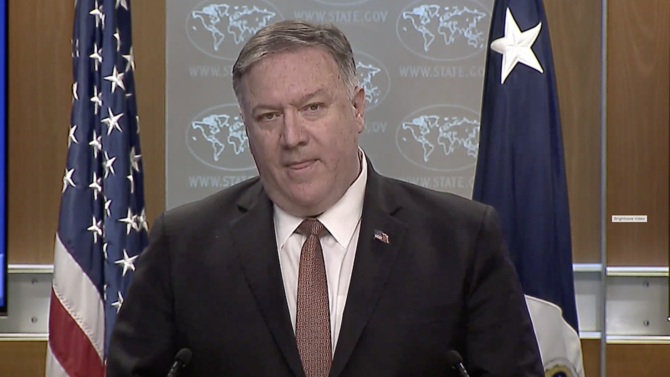WASHINGTON/JEDDAH: US President Donald Trump on Monday declared the Islamic Revolutionary Guard Corps (IRGC) in Iran a terrorist organization. It is the first time Washington has formally designated another country’s military a terrorist group, and comes into effect next Monday.
Trump said the “unprecedented” move “recognizes the reality that Iran is not only a State Sponsor of Terrorism, but that the IRGC actively participates in, finances, and promotes terrorism as a tool of statecraft.”
“The IRGC is the Iranian government’s primary means of directing and implementing its global terrorist campaign,” Trump said.
The move comes on top of Trump’s decision to pull the United States out of an international deal with Iran that was meant to lift crippling economic sanctions in return for the government allowing its nuclear technology to be restricted and kept under close supervision.
The Trump administration argues that Iran’s government, which is locked in a deeply hostile standoff with top US ally Israel, cannot be trusted and should face “maximum pressure.”
The US has already blacklisted dozens of organizations and individuals for affiliations with the IRGC, but not the organization as a whole. Those who do business with the Revolutionary Guards could now receive up to 20 years in prison and be barred from entering or doing business in the US. The new terrorist designation “makes crystal clear the risks of conducting business with, or providing support to, the IRGC,” Trump said. “If you are doing business with the IRGC, you will be bankrolling terrorism.”
The terrorist designation for the Revolutionary Guards is meant to strike at the heart of the Iranian government’s power structure.
The elite force was formed after the 1979 Islamic revolution with a mission to defend the clerical regime, in contrast to more traditional military units that protect borders.
At home, it has amassed strong political and economic influence.
Abroad, the Guards’ Quds Force supports Iranian allies, including Syrian President Bashar Assad and Lebanon’s Hezbollah.
In an important step to counter the Iranian regime’s terrorism, the U.S. has designated the Islamic Revolutionary Guard Corps, incl. Qods Force, as a Foreign Terrorist Organization. We must help the people of Iran get back their freedom. pic.twitter.com/T65CxJjRrr
— Secretary Pompeo (@SecPompeo) April 8, 2019
'Racketeers, not revolutionaries'
US Secretary of State Mike Pompeo, a strident critic of Iran, has pushed for the change in US policy as part of the Trump administration’s tough posture toward Tehran. The action had been debated for months as Washington sought additional ways to pressure Iran and curtail its growing influence in Syria, Iraq and Yemen.
Addressing reporters following Trump’s announcement, Secretary of State Mike Pompeo warned all banks and business of consequences to dealing with the Revolutionary Guards from now on.
“The leaders of Iran are racketeers, not revolutionaries,” Pompeo said. “Businesses and banks around the world now have a clear duty to ensure that companies with which they conduct financial transactions are not conducted with the IRGC in any material way.”
“This designation is a direct response to an outlaw regime and should surprise no one,” Pompeo said.
'Historic decision'
The Iranian-American Harvard scholar Dr. Majid Rafizadeh said Trump’s decision was historic.
“This is one of the most critical and historic developments since the establishment of the Islamic Republic in 1979,” he told Arab News.
“It has significant and serious legal, political and economic implications for dealings with the Islamic Republic and the IRGC. “The IRGC is the backbone of the clerical establishment in Iran. It controls significant sections of Iran’s economic and ideological centers.
” Iran condemned the decision as an illegal act prompted by Tehran’s regional influence and “success in fighting against Daesh.”
Tensions between the two countries have grown since Trump pulled the US out of the 2015 nuclear deal with Tehran last May and reimposed sanctions that had crippled Iran’s economy. Trump said the accord did not address Iran’s ballistic missile activity or its malign influence in the region.
Iran's 'blunt instrument'
Brian Hook, the State Department’s special representative for Iran, said the Middle East can not be more stable without weakening the IRGC. "It is the blunt instrument of Iran's foreign policy," he added.
A senior Trump administration official said the new measure would criminalize contact with the Guards and “enable our prosecutors to bring charges to those that bring material support to the IRGC.”
“The IRGC is interwoven into the Iranian economy.... The safest course is to stop doing business with the IRGC. If you do business with the IRGC you run the risk of bankrolling terrorism,” said the official, speaking on condition of anonymity.
Another official said the force has “been a principal driver of violence on a vast scale for many decades” in an attempt “to reshape the Middle East in Iran’s favor.”
Iran’s parliament has vowed to retaliate by passing an urgent bill putting American troops on its own terrorism blacklist.
“Even though we believe one should not play along with America’s extreme acts, the reality is that we must retaliate,” the head of Iran’s influential national security and foreign policy commission, Heshmatollah Falahatpisheh, told ISNA.
A statement signed by a majority of lawmakers in support of the bill said any action against Iran’s national security and its armed forces was “crossing a red line” and the US administration would “regret” its decision.





























